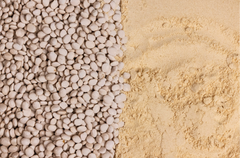
Why We Use Coconut Sugar
Sugar has a bad reputation. The overconsumption of sugar in processed foods which are often void of nutrients has left many with health issues. In a search for health, people often will cut out sugar, go on low carb diets like the keto diet, or swear off sweeteners and opt for artificial sweeteners like splenda, stevia, or erythritol. In cutting out carbohydrates/sugar people often miss out on vital nutrients and may develop health issues from the synthetic sweeteners they are using as alternatives. Moderation and sourcing is key, which is why we use organic coconut sugar and monk fruit extract to sweeten our Mikuna Chocho Superfood Protein Cacao and Vanilla flavors, ensuring your enjoyment and health.
CARBS//SUGARS
Have you ever heard of carbo loading? When gearing up for a big race or athletic feat, athletes may have a big bowl of pasta (or another carb heavy meal). This is not just a superstitious act, but actually has a scientific justification: our body always uses carbohydrates as fuel for exercise and movement of any type. Basically, our bodies break down carbs into glucose which enters your blood giving you energy to do everything from exercising to breathing. Glucose that is not used may be stored as glycogen in your body for later use. And, not all carbohydrates are equal. Foods with carbohydrates that are higher in fiber release the glucose into the blood slower than fiber void foods like sugary drinks and candy. (cite)
Research shows that during short and intense exercise carbs may even be the only energy source that provides for the working muscles and may be derived exclusively from the glycogen stores found within the muscles. Basically, the same way you put gas in your car before a long drive, humans need carbs and sugar in their tank before a day of hard work. Carbs are an essential macronutrient, and without them our muscles may not have adequate fuel and you can feel fatigued and lethargic. (cite)
Certain foods with carbohydrates, like fruits, also provide us with fiber which helps keep our digestion in tip top shape and helps to regulate the speed with which our bodies release the glucose into our blood. This speed is important, after all no one likes a blood sugar rush and the dreaded crash. So, when consuming sugar it's often important to get it with fiber to ensure that you can function properly without an energy crash. As you can see, it is important to consume carbohydrates and sugar as part of a balanced diet and it is also important to ensure you are sourcing these carbohydrates and sugars from foods with fiber and other nutrients to truly maximize your health.
SUGAR VS COCONUT SUGAR//

Now that we know that not all sources of carbohydrates and sugars are equal, let's take a closer look at the different kinds of sugars. The most popular sugar is just regular white table sugar. This sugar has a Glycemic Index of about 60-65. A Glycemic Index (GI) is a measurement of how a sugar affects your blood sugar or your blood glucose level. 60 is considered a medium GI value and anything over 70 is considered high, however to reduce the risk of diseases aiming for an average daily GI of 45 or less is ideal (cite). The higher the number, the faster the sugar is metabolized into the blood and the faster there is a spike in your blood sugar. This is often what leads to the notorious sugar rush/crash cycle. Additionally, table sugar is void of any micronutrients meaning it adds only carbs in the form of sugar to your diet.
Coconut sugar, on the other hand, has a GI value of 35. This is 50 % lower than the GI value of table sugar, meaning that it will spike your blood sugar less and will help you have a steady flow of energy rather than a rush and a crash. Additionally, consuming coconut sugar as an alternative may help you keep your daily GI average lower. Coconut sugar also contains other minerals and electrolytes such as iron, zinc, calcium, potassium, magnesium, and antioxidants (cite).
Additionally, coconut sugar undergoes little processing as compared to regular sugars. Regular granulated sugar comes from sugar cane. The sugar cane is cut and sent for processing, where it is rolled, the juice is extracted, and the juice is then thickened to take out the water, then the syrup is crystalized, then centrifugal force is used to squeeze out remaining liquid leaving dry sugar crystals. These crystals are then purified, decolorized, recrystallized and then dried (cite). This is a very long multi step complex process. Coconut sugar on the other hand is made from the sap from coconut palm trees. This sap is collected, boiled and dehydrated. That's it, just those three simple steps. You can see why coconut sugar is referred to as a minimally processed sugar. So, why do we use coconut sugar? It is minimally processed, has a low GI index, and has minerals, electrolytes, and antioxidants.
Our Mikuna Chocho Superfood Protein Cacao and Vanilla contains just 1-2g of coconut sugar per serving. When you use our protein, you can rest assured that the grams of coconut sugar and any other added sugar in your recipe will be slowly released into your blood because chocho contains 7g or 25% of your daily recommended intake of fiber. This fiber will help slow down your blood sugar spike, giving you steady energy throughout your workout or your workday. You can learn more about the other impacts of consuming fiber here. Additionally, Mikuna Chocho Superfood Protein contains monk fruit, a plant based zero calorie sweetener. The combo of coconut sugar and monk fruit will provide Mikuna Chocho Superfood Protein with flavor and extra antioxidants without compromising quality and health.Back to Journal


